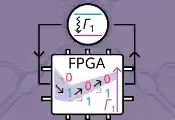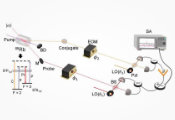Quantum AI Is Now on the Way – VTT Researchers Aim To Overcome Obstacles
September 29, 2025 -- An efficient combination of quantum computing and artificial intelligence (AI) can create valuable benefits, for example in materials science and complex simulations. Still, there are major obstacles to quantum AI. VTT researchers have identified several breakthrough areas that can help overcome those obstacles.
VTT researchers Pekka Pursula, Ahmad Farooq, Anssi Laukkanen and Piia Konstari present quantum AI in a peer reviewed article in the IEEE Nanotechnology journal. They address the benefits of quantum computers in AI applications and the ongoing development, and they outline a vision of what is still necessary to achieve quantum AI that is more efficient for both hardware and software.
“It is undeniable that AI will benefit greatly from quantum computing as soon as the technology becomes mature enough. Quantum computing is already benefiting from AI in many ways”, the researchers say.
They note that, for the time being, AI is following corporate leaders’ agenda. Quantum computing is also a hot topic, but only in smaller circles so far. The economic value of quantum computing is projected to reach up to USD 2 trillion by 2035.
Data transfer needs to become significantly more efficient
In practice, quantum computers alone might not meet the computing needs of AI in the future either. This is why the researchers assume that hybrid computing, or a combination of quantum computing and classic high-performance computing, will have to be used in AI applications now and in the future.
There are still major obstacles on the path to efficiency, the most important being related to data transfer between the quantum computer and the supercomputer. Opening these bottlenecks is a prerequisite for hybrid computing reaching the dimensions required by AI.
“We need new hardware solutions to develop more efficient quantum AI, especially as quantum computers are scaled up to larger qubit counts”, the researchers say.
The article describes how a persistent problem with quantum computers is the disruption-prone nature of the qubits that act as calculation units, which reduces reliability and requires a lot of debugging. The internal wiring and cooling of quantum computers and their control systems also require breakthroughs in hardware and software.
Quantum benefits to simulation, the optimisation of different fields and machine learning
Quantum computing would bring valuable benefits in several applications of AI. The researchers particularly highlight new AI models involved in simulating nature, solving optimisation problems, using quantum machine learning and quantum phenomena.
Quantum AI could speed up discoveries in chemistry and materials science through simulations, for example by overcoming the current classical computational limits. It could also help solve complex optimisation problems in logistics, supply chains and financing.
With regard to the development targets of hardware, the researchers especially focus on an aspect where Finland has a strong foothold: superconducting quantum computers. Of the competing technologies of quantum computers, this kind is considered to be the most mature. Superconducting quantum machines based on extreme cold demonstrated already in 2019 that they are capable of so-called quantum supremacy, meaning that they can outperform supercomputers in some tasks.
Much to do still in further development
Efficient quantum AI also requires optimising the software stack of quantum computers and improving how the computing burden is shared between high-performance computing and the quantum system. The researchers note that hybrid algorithms combining quantum and supercomputer computing methods should be more closely integrated with traditional high-performance computing resources.
To develop more efficient quantum AI, they suggest superconducting component-based hardware solutions such as optical control of qubits, cryogenic control electronics and solid-state cooling.
According to the researchers, achieving computational benefits from hardware requires the co-optimisation of software and hardware solutions. This is why development is necessary not only in qubit technology but also in other hardware components, software architecture and hybrid computing systems.




































